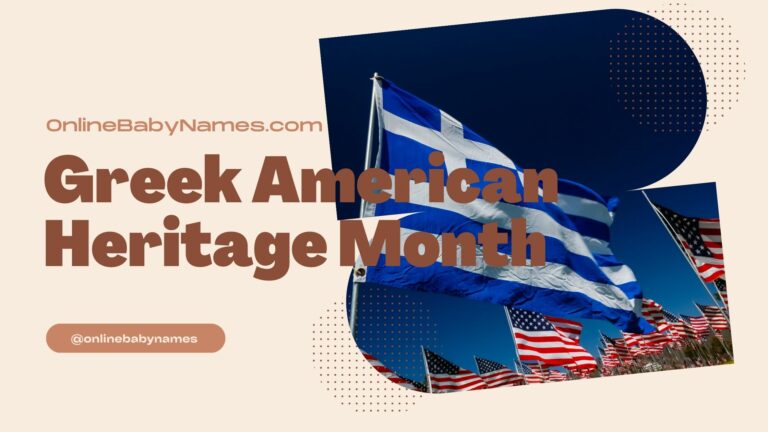
Celebrating Greek American Heritage Month is an excellent way to honor the rich history, vibrant culture, and significant contributions Greeks have made to American society. One unique way to commemorate this month is by exploring beautiful baby names inspired by the timeless and enchanting Greek culture. As a nod to your rich lineage, choosing a Greek-American name for your little one can bridge the gap between generations and create a lasting connection to your family’s roots.
The influence of Greek culture goes beyond mythology and philosophy; it intertwines with language and names as well. Drawing inspiration from Greek mythology, history and literary works provides an abundant source of captivating choices for your newborn’s name. Moreover, these names often carry deep meanings and stories, adding a layer of significance to your child’s identity.
With so many stunning names to choose from within Greek heritage, I’ll be shedding light on some of the most popular and meaningful options throughout this article. By sharing their meanings and impact on history, I hope to help you find a name that embraces your Greek-American heritage with pride and affection.
Understanding Greek American Heritage Month
Greek American Heritage Month is a time to celebrate the historical and cultural contributions that Greeks and Greek Americans have made to the United States. Throughout the month of March, various events and activities are held across the nation to recognize the rich ancestry and traditions of Greek Americans. Here, I’ll shed some light on the significance of this month-long celebration and how it contributes to preserving Greek culture and traditions in the US.
The origins of Greek American Heritage Month can be traced back to the immigration wave of the early 20th century. During that time, thousands of Greeks arrived in the United States, seeking better opportunities and a new life. They brought their cultural customs, traditions, and a strong work ethic, playing a major role in shaping many American cities. Nowadays, this heritage is celebrated through various festivities, including:
- Greek Independence Day parades
- Cultural exhibitions and lectures
- Greek film screenings
- Theatre performances and concerts
- Greek food festivals
Recognizing Greek American Heritage Month is also an opportunity to explore the remarkable achievements of notable Greek Americans in different domains. Some well-known personalities who have their roots in Greek heritage include:
- Actress and singer Rita Wilson
- Former astronaut Eugene Cernan
- Comedian and actor John Stamatopoulos (better known as “John Stamos”)
- Inventor of the oral polio vaccine Dr. Albert Sabin
Apart from the aforementioned events and prominent personalities, Greek American Heritage Month is also an opportunity to acknowledge the strong influence of Greek philosophy, arts, and architecture on modern Western culture. The elaborate architecture of the US Capitol building, for instance, is inspired by Greek designs. Many renowned educational institutions have Greek organizations on their campuses that further inspire and promote the Hellenic values of friendship, character development, and civic responsibility.
In conclusion, Greek American Heritage Month is an essential way to preserve and honor the rich history, culture, and traditions of Greeks and Greek Americans in the United States. From parades and exhibitions to exploring famous Greek personalities, this month-long celebration serves as an important reminder of the immense contributions Greeks have made to American society and our shared cultural heritage.
Significance of Greek Names in Greek Culture
When it comes to Greek culture, names hold a special place with deep-rooted meanings and historical significance. Greek names often come from mythology, history, or religious beliefs, which reveal the cultural values and aspects of Greek society.
Mythology is an integral part of Greek culture. As a result, many traditional Greek names have connections to legendary Greek gods, goddesses, and mythological heroes. For example:
- Zeus (Ζευς), the king of the gods, responsible for the sky, weather, and justice
- Hera (Ηρα), the queen of the gods, symbolizing marriage and family
- Athena (Αθηνα), the goddess of wisdom, war, and craftsmanship
- Apollo (Απολλων), the god of music, poetry, sun, and prophecy
In addition to mythology, some Greek names pay homage to important historical figures. This helps preserve family traditions and connect people with the rich history of their ancestors. Names inspired by historical figures include:
- Alexander (Αλεξανδρος), after the renowned conqueror, Alexander the Great
- Cleopatra (Κλεοπατρα), one of the most famous rulers of Egypt with Greek origins
- Helen (Ελενη), as in Helen of Troy, whose beauty sparked the Trojan War
Furthermore, there’s another vital aspect that influences Greek names: religious belief. Most Greeks are of the Orthodox Christian faith, and many choose names with biblical or religious importance. Such names often coincide with the names of saints or angelic beings. A few examples include:
- Michael (Μιχαηλ), the archangel who represents protection and courage
- Maria (Μαρια) or Mary (Μαρυ), after the Virgin Mary, the mother of Jesus Christ
- John (Ιωαννης), named after Saint John the Baptist or Saint John the Apostle
Greek culture also relies on the practice of name days, which serve as a way for families and friends to honor a person’s namesake saint. On a person’s name day, they may receive gifts or blessings from loved ones as a way to celebrate together.
In summary, Greek names embody a rich cultural heritage that represents mythology, historical figures, and religious beliefs. By choosing a Greek name for their child, parents create a strong connection to their heritage and the values of ancient Greece, keeping traditions alive and vibrant in modern times.
Influence of Greek Mythology on Baby Names
Greek mythology has always held a certain mystique and allure, especially when it comes to baby names. These names often carry the weight of history, myth, and tradition, and they’re rooted in compelling stories that have stood the test of time. For Greek American Heritage Month, let’s take a closer look at how Greek mythology has played a role in influencing the selection of baby names.
One aspect of Greek mythology that has long captivated parents is the range of formidable and iconic characters found in the stories. Names like Hercules, Achilles, and Perseus remain popular choices for baby boys due to their association with strength, bravery, and heroism. Similarly, Greek goddesses provide fitting inspiration for baby girl names. Some favorites include Athena, goddess of wisdom; Artemis, goddess of the hunt; and Iris, the goddess of the rainbow.
It’s not just the names of gods and goddesses that have captured the imaginations of parents, though. Greek myths are rife with fascinating creatures and legendary places, giving rise to names like Phoenix and Atlas. Some have even drawn inspiration from the more subtle aspects of Greek mythology, such as the names Asteria, meaning “starry”, and Arista, meaning “the best”.
When considering the influence of Greek mythology on baby names, the following are some excellent examples that showcase this enduring appeal:
Goddesses:
- Aphrodite: goddess of love and beauty
- Demeter: goddess of agriculture
- Hera: goddess of marriage and family
Gods:
- Ares: god of war
- Apollo: god of the sun, music, and prophecy
- Hermes: god of travel, commerce, and thievery
Unique choices inspired by myth:
- Eros: god of love and desire
- Nyx: goddess of the night
- Leda: the mythological queen of Sparta
As I mentioned earlier, names inspired by legendary places or creatures are also popular among parents. A few examples include:
- Colossus: from the Colossus of Rhodes, a giant statue and ancient wonder of the world
- Phoebe: a Titaness associated with the moon and prophecy
- Chimera: a fantastical creature made up of parts from different animals
Greek mythology has indeed left a strong mark on the world of baby names. With such a rich heritage and a wealth of captivating tales, it’s no wonder that parents continue to turn to these names when seeking out inspiring and timeless options for their little ones.
Classic Greek Baby Names with Historic Roots
Greek culture has a rich history, full of legends and mythological figures that have persisted through the ages. When it comes to baby names for Greek-American Heritage Month, there’s certainly no shortage of classic names with historic roots. Here are some timeless options worth considering:
Girls’ Names
- Sophia: A popular name meaning “wisdom,” it stems from the Greek word “σοφία” and has been a long-time favorite among parents.
- Athena: Named after the Greek goddess of wisdom, courage, and inspiration, this name exudes strength and intelligence.
- Helen: With its origin in ancient Greece, this name means “shining light” and is reminiscent of the famous Helen of Troy.
Boys’ Names
- Alexander: Derived from the Greek name “Ἀλέξανδρος”, it means “defender of the people.” Many great historical figures, like Alexander the Great, have shared this name.
- Nicholas: Meaning “victory of the people,” this classic name has been widely adopted in various cultures.
- George: Stemming from the Greek word “γεωργός,” which means “farmer” or “earthworker,” it has been a popular name throughout history, including St. George, the patron saint of England.
Aside from these well-known choices, there are also lesser-known yet equally captivating Greek baby names rooted in history, such as:
- Girls: Iris (Greek goddess of the rainbow), Daphne (nymph in Greek mythology), and Selene (goddess of the moon).
- Boys: Leander (meaning “lion man”), Demetrius (worshiper of the Greek goddess Demeter), and Evander (meaning “good man”).
When looking for baby names with historic roots, it’s important to consider the meanings and stories behind them. Greek mythology is brimming with strong, inspiring figures that could serve as the perfect namesake for your little one.
Moreover, embracing your Greek heritage by choosing a significant name can encourage a connection to their ancestral roots as they grow. With so many incredible options to choose from, you’re sure to find the perfect name for your child during Greek-American Heritage Month!
Greek Names with Characteristic Meanings
Celebrating Greek American Heritage Month, I’ve compiled a list of Greek baby names with special meanings. These names possess vibrant cultural significance and can be a great choice for parents wanting to honor their Greek heritage. To make it easy, I’ve split the list into two parts: Greek baby boy names and Greek baby girl names. Let’s dive into these unique, meaningful names.
Greek baby boy names:
- Alexander: Meaning “defender of the people,” this iconic name remains popular among Greek Americans. From Alexander the Great to Alexander Graham Bell, many prominent figures share this name.
- Damian: Derived from the Greek word “damao,” Damian means “to tame” and is often associated with a calm and patient demeanor.
- Nikolas: Meaning “victory of the people,” this Greek staple can be shortened to Niko for a more modern twist without losing its powerful meaning.
- Theodore: Rooted in Greek, Theodore translates to “gift of God,” giving it a heartwarming and spiritual significance.
Greek baby girl names:
- Sophia: Often topping the charts, Sophia means “wisdom” in Greek and has become an icon of beautiful and meaningful names.
- Elena: A popular option, Elena is derived from “Helene,” meaning “shining light” and shares a root with the word “selene,” the Greek moon goddess.
- Iris: Associated with the ancient Greek goddess of the rainbow, this striking name represents hope and offers a touch of the divine.
- Melina: A lovely Greek name, Melina signifies “quince yellow,” evoking images of bright Mediterranean sunshiny days.
In addition to these fantastic baby names, I’ve found that many Greek names share inspirational and historically significant qualities. Here are some of the most common themes found in Greek baby names:
- Strength and power: Names like Alexander, Nikolas, and Andronikos manifest power, strength, and victory, showcasing attributes cherished in the Greek culture.
- Wisdom and intellect: Celebrating mental prowess, names like Sophia, Athena, and Socrates pay homage to Greek’s rich intellectual tradition.
- Nature and beauty: Many names, such as Iris, Daphne, and Thalia, draw inspiration from nature, illustrating the deep connection to Greek’s natural world.
When choosing a baby name to celebrate Greek American Heritage Month, consider the rich significance, beautiful meanings, and cultural allure that each name offers.
Connection Between Greek and American Names
When it comes to baby names, many people appreciate the opportunity to connect with their cultural heritage. For those celebrating Greek American Heritage Month, it’s often helpful to understand the relationship between Greek and American names. There’s a rich history of Greek influence on American names, and I’ll explore those connections in this section.
Greek names have made their presence known in the United States due to a long history of immigration and the lasting influence of Greek culture. You might be surprised to learn that many popular American names have Greek origins, which can provide a meaningful link to your Greek American heritage. Some examples include:
- Alexander: derived from the Greek name Alexandros, meaning “defender of the people”
- Sophia: from the Greek word for “wisdom,” it’s been a popular name for centuries
- Natalie: based on the Greek name Natalia, meaning “born on Christmas Day”
- Derek: derived from the Greek name Theodoros, meaning “gift of God”
There are also a number of American names that are adaptations or variations of original Greek names. These modifications and transliterations provide a unique blend of the two cultures. Some examples include:
- Tina: a short form of Christina or other names ending in ‘-tina’, originating from the Greek name Christina, meaning “a Christian”
- Nick: a diminutive of Nicholas, which comes from the Greek name Nikolaos, meaning “victory of the people”
- George: derived from the Greek name Georgios, meaning “worker of the earth” or “farmer”
Another way the connection between Greek and American names can be seen is through Greek mythology. There has been a resurgence of interest in names inspired by Greek gods, goddesses, and mythological figures, further strengthening the connection between these two cultures. Some popular mythological names include:
- Athena: the Greek goddess of wisdom and warfare
- Apollo: the Greek god of music, poetry, and sun
- Iris: a Greek goddess associated with the rainbow
- Hector: a Trojan hero in Greek mythology
In addition to individual names, there are also trends in naming that stem from Greek culture. For instance, many Greek names have a tradition of incorporating desirable attributes or virtues within the name’s meaning. This practice can easily translate to American naming conventions, where parents often choose names that reflect desirable traits or qualities.
So, for Greek American Heritage Month, it’s fascinating to consider the varied connections between Greek and American names. Embracing these connections can help foster a deeper understanding of one’s cultural identity and provide a meaningful context when choosing a baby name.
Greek-inspired Baby Names Celebrities Love
I’ve noticed that there’s a trend among celebrities to choose Greek-inspired baby names for their little ones. It seems like these names not only pay homage to their cultural heritage but also have a unique, timeless quality to them. Here are some examples of some famous faces who’ve opted for these Greek-origin names for their children.
Tom Hanks and Rita Wilson chose the name Chet, which is a Greek name meaning omen or an oracle. Similarly, Elizabeth Hurley named her son Damian, which has its roots in Greek and signifies “to tame” or “to conquer.”
Many celebrities also love names inspired by Greek mythology. Actress Alicia Silverstone named her son Bear Blu, inspired by the Greek words for bear, “arktos,” and “blu,” meaning blue. Brad Pitt and Angelina Jolie named their daughter Shiloh, which translates to peace, tranquility, and silence in various Mediterranean languages, including ancient Greek.
Here’s a table showing some notable celebrities along with their kids’ Greek-inspired names:
| Celebrity | Child’s Name | Greek-inspired Meaning |
|---|---|---|
| Tom Hanks | Chet | Omen, Oracle |
| Elizabeth Hurley | Damian | To Tame, To Conquer |
| Alicia Silverstone | Bear Blu | Bear, Blue |
| Brad Pitt | Shiloh | Peace, Tranquility |
Additionally, a few unisex Greek baby names have won the hearts of famous parents. Some examples include:
- Phoenix: Associated with the mythological bird of the same name, Joaquin Phoenix and Mel Gibson both have a child named Phoenix.
- Dylan: This name draws inspiration from the Greek word for the ocean and has been chosen by celebrities like Pierce Brosnan and Robin Wright.
Lastly, celebrities aren’t just opting for traditional Greek names but are also finding inspiration in Greek words. For example:
- Tina Fey chose the name Penelope, which is derived from the Greek word “pēnelops,” referring to a type of duck. In Greek mythology, Penelope was the wife of Odysseus and a symbol of fidelity and patience.
- Kourtney Kardashian named her daughter Penelope as well, likely for its unique Greek origin and meaning, in addition to the modern abbreviation, “Penny.”
In celebration of Greek American Heritage Month, it’s lovely to see these Greek-inspired names grace the lives of celebrities and their offspring. These names not only hold a deep connection to the rich history and mythology of Greece but also offer a sense of uniqueness, beauty, and charm that can seamlessly integrate into modern naming preferences.
Choosing the Perfect Greek Baby Name
Finding the perfect Greek baby name can be both exciting and overwhelming, but I’m here to help you navigate this journey. It’s essential to choose a name that carries meaning, honors your heritage, and reflects your personal taste. Let’s dive into some tips and considerations that will help you make that important decision.
First and foremost, think about your Greek American heritage and the values you want to pass on to your child. Focus on names that have a connection to heroes, myths, or historical figures from Greek history and mythology, as these names often carry significant meaning and virtues. Some popular choices include:
- Alexander, after Alexander the Great
- Demetri, related to the Greek goddess Demeter
- Athena, the goddess of wisdom and warfare
- Helen, the famed beauty from the Trojan War
Secondly, consider your family traditions and whether you want to choose a name that has been passed down through generations. It’s common in Greek culture to name a child after a grandparent, and this can be a meaningful way to connect your baby to their lineage. Be open to variations or modifications that blend both traditional and modern elements.
When it comes to pronunciation and spelling, it’s a good idea to ponder how the name will be perceived and pronounced in an American context. Choosing a name that’s easily recognizable and pronounceable can save your child from a lifetime of correcting others. Keep in mind popular names, such as:
- Sophia, a classic Greek name meaning wisdom
- Nikos, a strong name derived from the Greek word for victory
- Chloe, representing fertility and associated with the goddess Demeter
- Theo, a popular short form of the Greek name Theodore
Another important aspect is to consider any potential nicknames or diminutives, as these can become part of your child’s identity and influence how they are perceived. Go for names that have positive and appealing nicknames, but don’t stress too much if you can’t find one, as children often develop their own unique names among friends.
Lastly, remember that the perfect name is one that resonates with you and your family. Take your time, and don’t be afraid to think outside the box. Happy naming!
Greek Name Pronunciation and Nicknames
When choosing a baby name to celebrate Greek American Heritage Month, it’s essential to understand Greek name pronunciation and the use of nicknames. Grasping this information will not only help you honor Greek culture but also provide practical insight when you finally decide on a name.
In general, Greek names tend to have a stress on the penultimate (second-to-last) syllable. That said, the accents in Greek names may vary, especially when considering regional dialects. For example, consider the names Elena and Alexandra. Greeks usually pronounce them with stress on the ‘le‘ and ‘xan‘, respectively.
When it comes down to Greek nicknames, it’s interesting to note that they often appear significantly different from their full names. Some even have multiple options for nicknames. A few examples include:
- Georgios (full name) / Giorgos or Yorgos (nicknames)
- Ioannis (full name) / Yannis, Giannis, or Yianni (nicknames)
- Konstantinos (full name) / Kostas, Dinos, Kosta, or Kostis (nicknames)
To further illustrate Greek name pronunciation and the extensive array of nicknames, let’s take a look at some popular Greek names along with their different variations and pronunciations:
| Greek Name | Pronunciation | Nickname(s) |
|---|---|---|
| Anastasia | Ah-nah-STAH-see-yah | Ana, Tasia, Stacy |
| Athanasios | Ah-thah-NAH-see-os | Thanos, Thanasi, Nasos |
| Dimitrios | Dee-mee-TREE-os | Dimitri, Jim, Jimmy, Mimi |
| Efstathios | Ef-stah-THEE-os | Stathis, Stathi |
| Fotini/Fotios | Fo-TEE-nee/Fo-TEE-os | Tini, Fotis, Fote |
| Panagiotis | Pah-nah-YO-tis | Panos, Panagis, Panagos |
| Theodoros | The-oh-DOH-ros | Theo, Doros, Thodoris |
| Vasiliki/Vasilios | Vah-see-LEE-kee/Vah-see-LEE-os | Vaso, Vasilis, Vasso, Bill |
By understanding Greek name pronunciation and common nicknames, you’ll be better equipped to select a name that honors your Greek American heritage. Be sure to take your time, embrace the richness of Greek culture, and choose a name that carries both personal and historical significance for you and your family.
Conclusion: Celebrating Greek American Heritage with Baby Names
Throughout this article, I’ve explored the vibrant history and cultural significance of Greek baby names, delving into their meanings, pronunciation, and symbolism. Choosing a name for your little one is a deeply personal decision, often drawing upon ancestry and heritage to create the perfect moniker. By selecting a Greek name for your child, you’re not only celebrating your Greek American heritage but also carrying on a rich legacy.
Some of the names I’ve discussed in this article offer insight into the strength and resilience of Greek history, such as:
- Alexander (Defender of the People)
- Demetrius (Follower of Demeter)
- Helen (Shining or Bright)
- Athena (Goddess of Wisdom and War)
Others embody the ethos of Hellenic ideals, reflecting the virtues and aspirations of the ancient Greeks, including:
- Andreia (Courage)
- Sofía (Wisdom)
- Kalokagathia (Nobility and goodness)
- Eleftheria (Freedom)
By choosing a Greek baby name, you’ll provide your child with a strong, unique, and meaningful identity. These names not only honor your family’s Greek American heritage but also cultivate an appreciation for the enduring values and wisdom of ancient Greece.
In conclusion, Greek baby names are an excellent way to celebrate and honor your heritage during Greek American Heritage Month. By selecting a name with cultural significance and deep-rooted meaning, you’re giving your child a legacy to cherish. I hope this article has provided inspiration and guidance in your search for the perfect name to represent your family’s rich Greek American history.




